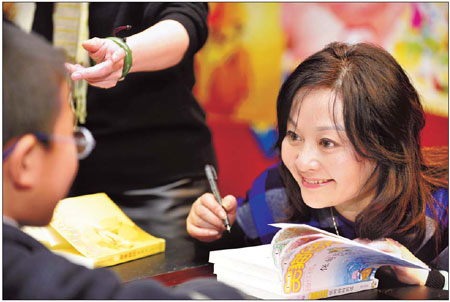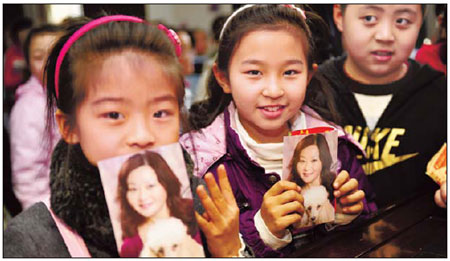Life
If you're happy and you know it ...
By Mei Jia (China Daily)
Updated: 2010-12-24 08:19
 |
Large Medium Small |
|
Yang Hongying, the first Chinese children's author to enter the mainstream English book market, at a book signing event in Xi'an, Shaanxi province. Chen Tuanjie / for China Daily |
|
Young readers are drawn to Yang's books as she writes from their perspective. Chen Tuanjie / for China Daily |
Known as 'China's J.K. Rowling', Yang Hongying's best-selling children's works are rapidly finding a foreign audience. Mei Jia reports
One of children's author Yang Hongying's earliest fantasies as an elementary schoolteacher in the 1980s was creating a pair of glasses for angry teachers that magnified the merits of their students, so everyone was happy.
Yang recognized early on the excessive emphasis on discipline in the nation's classrooms and was determined to change this by emphasizing trust and happiness in her books.
Hailed as "China's J.K. Rowling" in terms of success and influence, Yang is the first Chinese children's author to enter the mainstream English book market.
"The performance of Yang's books is the best among the books we've introduced from China to the English-speaking world," says Stella Chou, managing director of Harper Collins China Business Development.
Harper Collins has acquired the multilingual copyrights of Yang's works, like Mo's Mischief and Diary of a Smiling Cat. It has so far published 200,000 copies of six books from the Mo's Mischief series in English, targeting countries like the United States and Britain.
"Yang is the best-selling Chinese writer with the most favorable traits required to be introduced abroad," says Chou, who became interested in Yang's works 10 years ago.
Chou thinks her books have a universal appeal.
"Yang's books offer insight into contemporary society through a typical Chinese child, and a typical Chinese cat," Chou says. "They're good reads for people with an increasing interest in China."
Having sold an astounding 40 million copies of her works in China alone, Yang has occupied a prominent place on the list of "Richest Chinese Writers" since 2006. It is compiled by the Shanghai-based Wu Huaiyao and is based on extensive market research.
"Most of the bookstores I went to for the survey, even in small towns, have a whole wall of Yang's books for sale," Wu says.
But the writer is reluctant to talk about her financial success. The Richest Chinese Writers list has been a headache for her, she says.
"I keep myself detached from the adult world to maintain a quiet and pure mind, as my job is to write for children. I want to build for them a warm and lovable world, free of grown-up's judgment and thinking," says Yang, sitting in her Beijing apartment.
Yang moved to the capital from her hometown, of Chengdu, Sichuan province, two years ago. The 48-year-old has been writing for children for almost three decades.
In 2000, when Yang's novel, Girl's Diary, became a hit, people started talking about her sudden fame. Her achievements are not just a marketing triumph, Yang says.
"No selling strategies can be more effective and persuasive than the quality of the works," she says. "I write stories from my heart, fully concentrating on just one thing at a time."
As the youngest daughter in an office clerk's family, Yang credits her parents, especially her father Yang Tianxiao, for allowing her space to develop her own character.
"My father only asked one thing of me - to be a good person," she recalls.
She describes her father as a typical Chengdu person, who enjoys seasonal pleasures. She says he would take the family to see peach blossom in Longquan district, in spring; lotus flowers and bamboo in summer; osmanthus flowers at Guihu Lake in autumn; and the yellow plum flower during winter.
Yang says she learned to savor nature's beauty and this is a constant inspiration in her works.
Extensive reading is her other source of inspiration. She pays special attention to vivid descriptions, such as eating and drinking in A Dream of Red Mansions, and the debut of the protagonists in Outlaws of the Marsh.
"One point from each book, finely chewed, became nutrition for me," she says.
At 18, she became an elementary schoolteacher. She says she felt lonely, as she wasn't like her colleagues, dutiful but stern and always dwelling on their students' faults.
Yang recalls that her debut work was inspired by a survey of her grade 2 elementary students that found the textbooks they used offered few articles the children really liked.
She believes that children should be happy and liberated from school and parental pressure. She sought answers in the classics by international educators such as Vasyl Sukhomlynsky (1918-1970) of the former Soviet Union. Her notes on the subject were more than a meter high.
Having been a teacher for seven years and a children's literature magazine editor for another seven, Yang believes children's book writers should have years of experience with children, a profound understanding of society, and most importantly, the ability to abstract life's essence using simple language.
Children's book critic Tan Xudong says one of the key reasons for Yang's huge success is that she understands and feels close to children. She writes from their perspective and conveys wisdom.
"I'm not writing just fun books," she says. She offers no fantasy worlds for her readers, who are predominantly elementary school students, aged 6-12. She teaches them to deal with both happiness and sadness, offering the keys to ease the sorrows of growing up.
In Mo's Mischief, elementary school boy Mo-Shen Ma (Ma Xiaotiao) is far from the perfect straight-A student.
"Ma makes mistakes and matures from correcting them. Readers like him because he's ordinary, like them, and they grow up with him. There aren't many characters like Ma in the literary world, so readers like to join him on his great adventures," the writer says.
But Ma is a good-hearted boy, a motif that she took to heart from her father.
"Children like the real, the good and the beautiful," she says. "My stories are fundamentally about being good people, with love, sincerity and lenience."
She says she'll never follow a trend or pursue profit and describes writing as walking on thin ice. She says she may spend three months on a novel's beginning.
Publisher and critic Zheng Zhong believes Yang has opened up a new era for children's literature.
"In the past decade, she's been the only domestic writer who can compete with foreign writers at this level," Zheng says. "Yang gets children to read. Parents are thankful to Yang that her books have torn their children away from their computer screens."
Yang adds that though she offers Chinese wisdom, this has a universal value, as it addresses basic human needs.
The humorous and smart language, written simply, makes her books accessible even after translation.
Harper Collins has paid a lot of attention to rendering the essence of her books while continuing to localize the language, Chou says.
"Although you're able to write beautifully with a fountain pen as an adult, you must abandon it and swiftly move to pencil, even better to colored pencils, when you write for children," Yang says.

